1902 Search Results for video of the week
January 15, 2019
by Carole Zangari -
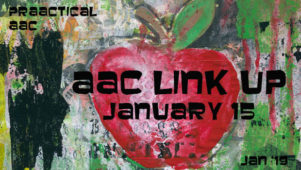
Happy Tuesday, AAC friends! Once a week, we invite you to share your own AAC-related content, product news, or anything else that you’d like others in the AAC community to know about. It may be a recent post you’ve written, a slide deck from your AAC presentation, a handout, video, or meme that you’ve posted online, an AAC product you’ve created, an announcement for an AAC camp or conference, or any other prAACtical content you developed and want to share with the AAC community. To post your own link, scroll all the way down to the bottom of this post and complete the form. Enter the URL and the name/title in the boxes provided below. If you are on a mobile device, click over to the full website version to do this. The AAC Link Up is moderated to keep us from being spammed, so it may take a little while... [Read More...]
January 8, 2019
by Carole Zangari -
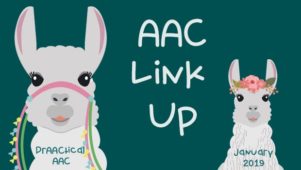
Happy Tuesday, AAC friends! Once a week, we invite you to share your own AAC-related content, product news, or anything else that you’d like others in the AAC community to know about. It may be a recent post you’ve written, a slide deck from your AAC presentation, a handout, video, or meme that you’ve posted online, an AAC product you’ve created, an announcement for an AAC camp or conference, or any other prAACtical content you developed and want to share with the AAC community. To post your own link, scroll all the way down to the bottom of this post and complete the form. Enter the URL and the name/title in the boxes provided below. If you are on a mobile device, click over to the full website version to do this. The AAC Link Up is moderated to keep us from being spammed, so it may take a little while... [Read More...]
December 18, 2018
by Carole Zangari -
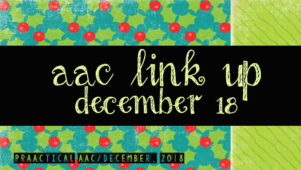
Happy Tuesday, AAC friends! Once a week, we invite you to share your own AAC-related content, product news, or anything else that you’d like others in the AAC community to know about. It may be a recent post you’ve written, a slide deck from your AAC presentation, a handout, video, or meme that you’ve posted online, an AAC product you’ve created, an announcement for an AAC camp or conference, or any other prAACtical content you developed and want to share with the AAC community. To post your own link, scroll all the way down to the bottom of this post and complete the form. Enter the URL and the name/title in the boxes provided below. If you are on a mobile device, click over to the full website version to do this. The AAC Link Up is moderated to keep us from being spammed, so it may take a little while... [Read More...]
December 17, 2018
by Carole Zangari -
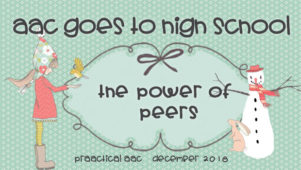
We’re so pleased to welcome back Sarah Mueller, who teaches high school students with intellectual and developmental disabilities in Rochester, Michigan. In this post, she shares her experiences in working with peer mentors and how she has helped to facilitate meaningful relationships between students with and without disabilities. Don’t miss her video or the links to download some of the materials they used. Enjoy! The Power of Peers We often talk about the functions of communication and their importance in developing and expanding the students’ communicative repertoire. Moving beyond requesting to protesting, commenting, and greeting and other functions is often the focus. But as high schoolers included in the school community, my students want to be social with their peers without disabilities. What does that look like for students with complex communication needs? How, as a teacher, can you structure social opportunities to teach and practice core? What... [Read More...]
December 13, 2018
by Carole Zangari -
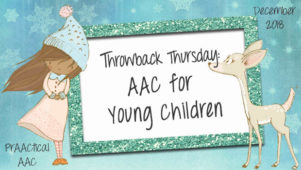
In recent weeks, we’ve been getting lots of questions about using AAC with young children. There are lots of ways to approach this so today we are looking back at some of our earlier posts on AAC at the preschool level. If this is a topic of special interest to you, don’t miss the announcement about a giveaway at the end of the post. Using Vest Displays with Preschoolers on the Autism Spectrum with guest author Dr. Carol Goossens’ Mining the Preschool Routine for PrAACtical AAC Opportunities Supporting Preschoolers with AAC Needs: A Case Study Visual Supports in Action in the Preschool Classroom TELL ME: AAC in the Preschool Classroom Attainment, the publisher of TELL ME (Teaching Early Language and Literacy through Multimodal Expression) is generously providing a free copy of the program through a contest they are running. TELL ME your AAC story for a chance to win a... [Read More...]
December 11, 2018
by Carole Zangari -

Happy Tuesday, AAC friends! Once a week, we invite you to share your own AAC-related content, product news, or anything else that you’d like others in the AAC community to know about. It may be a recent post you’ve written, a slide deck from your AAC presentation, a handout, video, or meme that you’ve posted online, an AAC product you’ve created, an announcement for an AAC camp or conference, or any other prAACtical content you developed and want to share with the AAC community. To post your own link, scroll all the way down to the bottom of this post and complete the form. Enter the URL and the name/title in the boxes provided below. If you are on a mobile device, click over to the full website version to do this. The AAC Link Up is moderated to keep us from being spammed, so it may take a little while... [Read More...]
December 10, 2018
by Carole Zangari -
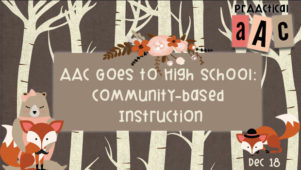
We’re so glad to share the work of Sarah Mueller, a special education teacher in Rochester, Michigan, who returns to talk about AAC with older students. Sarah teaches high school and works with many students who have developmental disabilities. She strives to embed language and communication throughout her students’ entire school experience and help them become strong self-advocates as they prepare for adult life. In this post, Sarah talks about supporting AAC learners who are working with AAC systems rich in core vocabulary as they prepare for their weekly trips into the community. :::::::::::::::::::::::::::::::::::::::::::::::::::::::::::::::::::::::::::::: Core in the Community Core vocabulary is often embedded in the typical instructional tasks of the school day: communication exchanges, calendar time, literacy, etc. Like most high school teachers for students with intellectual disabilities, community-based instruction (CBI) is a component of my classroom program. My classroom becomes the community every single week! It is yet another setting where I... [Read More...]
December 4, 2018
by Carole Zangari -

Happy Tuesday, AAC friends! Once a week, we invite you to share your own AAC-related content, product news, or anything else that you’d like others in the AAC community to know about. It may be a recent post you’ve written, a slide deck from your AAC presentation, a handout, video, or meme that you’ve posted online, an AAC product you’ve created, an announcement for an AAC camp or conference, or any other prAACtical content you developed and want to share with the AAC community. To post your own link, scroll all the way down to the bottom of this post and complete the form. Enter the URL and the name/title in the boxes provided below. If you are on a mobile device, click over to the full website version to do this. The AAC Link Up is moderated to keep us from being spammed, so it may take a little while... [Read More...]
November 27, 2018
by Carole Zangari -
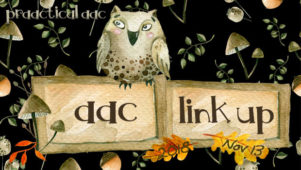
Happy Tuesday, AAC friends! Once a week, we invite you to share your own AAC-related content, product news, or anything else that you’d like others in the AAC community to know about. It may be a recent post you’ve written, a slide deck from your AAC presentation, a handout, video, or meme that you’ve posted online, an AAC product you’ve created, an announcement for an AAC camp or conference, or any other prAACtical content you developed and want to share with the AAC community. To post your own link, scroll all the way down to the bottom of this post and complete the form. Enter the URL and the name/title in the boxes provided below. If you are on a mobile device, click over to the full website version to do this. The AAC Link Up is moderated to keep us from being spammed, so it may take a little while... [Read More...]
November 20, 2018
by Carole Zangari -
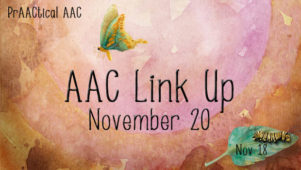
Happy Tuesday, AAC friends! Once a week, we invite you to share your own AAC-related content, product news, or anything else that you’d like others in the AAC community to know about. It may be a recent post you’ve written, a slide deck from your AAC presentation, a handout, video, or meme that you’ve posted online, an AAC product you’ve created, an announcement for an AAC camp or conference, or any other prAACtical content you developed and want to share with the AAC community. To post your own link, scroll all the way down to the bottom of this post and complete the form. Enter the URL and the name/title in the boxes provided below. If you are on a mobile device, click over to the full website version to do this. The AAC Link Up is moderated to keep us from being spammed, so it may take a little while... [Read More...]









